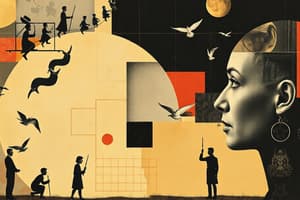Podcast
Questions and Answers
What is the main characteristic of a correspondence course?
What is the main characteristic of a correspondence course?
- A flexible and self-governing way to study
- A program designed for out-of-school youth only
- A system that allows students to proceed at their own pace (correct)
- A type of education that requires contiguous communication
What is the primary goal of the Alternative Learning System in the Philippines?
What is the primary goal of the Alternative Learning System in the Philippines?
- To develop a productive citizenry
- To promote human rights education
- To provide education for all citizens
- To give chances for the out-of-school youth to finish their education (correct)
What does the term 'distance learning' refer to?
What does the term 'distance learning' refer to?
- A program designed for remote areas only
- A flexible and self-governing way to study
- Non-contiguous communication between teacher and learner (correct)
- A type of education that requires face-to-face interaction
What is the ultimate goal of the Alternative Learning System?
What is the ultimate goal of the Alternative Learning System?
What type of education is the Alternative Learning System a part of?
What type of education is the Alternative Learning System a part of?
What does the term 'open learning system' refer to?
What does the term 'open learning system' refer to?
What is the relationship between the Alternative Learning System and formal education?
What is the relationship between the Alternative Learning System and formal education?
What is a major barrier to education?
What is a major barrier to education?
What is the focus of the Mother Tongue-Based Education Program?
What is the focus of the Mother Tongue-Based Education Program?
What is the goal of the Education for All program?
What is the goal of the Education for All program?
Flashcards are hidden until you start studying
Study Notes
Historical Background of Education
- The Greek word "schole" means leisure, and ancient Greeks perceived education as a system where man exercises his faculties to be a significant member of society.
- Aristotle believed that the role of education is to help an individual improve their lot in life as an ultimate virtue.
- Socrates believed that education can be acquired through experiences and actual observation.
- John Dewey viewed education as knowledge that can be acquired through the interaction of the faculties and environmental experiences of an individual.
- John Piaget believed that education is about teaching how to survive.
Ancient Education Systems
- In ancient Greece, education was only for upper-class boys, and it focused on science, philosophy, and the study of Greek, Latin, and Hebrew languages.
- Mathematics and medicine were learned from the Arabs.
- During the imperial period, indigenous culture was viewed as uncivilized and inferior, leading to the virtual destruction of tribal culture.
The Role of Education in Society
- Education helps individuals improve their lot in life and acquire the necessary knowledge, skills, values, and attitude for their future position in life.
- Education serves as a means of social integration, where people contribute to a shared set of beliefs and values.
- Education facilitates social interaction, strengthens equality, and preserves the socio-cultural heritage.
Theories of Education
The Functionalist Perspective
- Education performs a number of important services that contribute to the operation and maintenance of society.
- Manifest functions of education include teaching children to get along, transmitting knowledge and skills, and helping cultural integration.
- Latent functions of education include establishing social relationships and networks, and decreasing job competition.
The Conflict Perspective
- Education develops people's individual talents and skills, but promotes social inequalities based on sex, race, ethnicity, and social class.
- The hidden curriculum teaches students to conform to societal norms and expectations.
The Symbolic Interactionism Perspective
- Education is a process of labeling, where students are ranked according to their competence and intelligence.
- Ability grouping is a form of inequality, where students are clustered into classes or tracks based on their abilities.
Types of Education
Formal Education
- Guided by a systematic, organized educational model, structured and administered based on a given set of laws, rules, and norms.
- Offers a rigid curriculum that contains objectives, content, and methodology.
Non-Formal Education
- Does not require student attendance, and the process of learning is not rigid.
- The curriculum and methodology are flexible and designed to adapt to the needs and interests of the students.
Informal Education
- A lifelong learning process, where individuals acquire attitudes, values, skills, and knowledge from their environment and daily experiences.
- Includes learning from various sources, such as videos, self-study, reading articles, and participating in forums and chat rooms.
Barriers to Education
- Lack of access to formal education, particularly for out-of-school youth.
- The need for alternative learning systems, such as the Alternative Learning System in the Philippines.
Studying That Suits You
Use AI to generate personalized quizzes and flashcards to suit your learning preferences.




